Books
Books
published in 2013

Theory, A Sunday
Louky Bersianik, Nicole Brossard and 4 more
Collectively authored by Louky Bersianik, Nicole Brossard, France Théoret, Gail Scott, Louise Cotnoir, Louise Dupré, Lisa Robertson, and Rachel Levitsky. Twenty-five years after its first French language publication, Theory, A Sunday (2013), a collaborative feminist poetics text, marks the first in Belladonna’s new Germinal Texts series. Written through Sunday meetings in Montreal, this volume gathers six women’s theoretical feminist texts, with a new introduction by Lisa Robertson and afterword by Gail Scott and Rachel Levitsky. Translators of this text include Erica Weitzman, Luise von Flotow, Popahna Brandes, and Nicole Peyrafitte.
Germinal Texts trace feminist avant-garde histories and the poetic lineages they produce. Focused on authors and texts that provide generative grounds for other writers and their work, Germinal Texts gesture to networks of affiliation, whether explicit or subterranean; to kinships and inheritances; to the unfolding of a text through its readership; and to always provisional origins without endings. Germinal Texts are works that gather dense histories and, for this reason, the series is designed to hold a space for critical discussion, with contextualizing front and back matter that launches new conversations.
Louky Bersianik (1930-2011) is the author of twelve books of poetry and prose. Essayist, novelist and poet, her much admired novel L’Eugélionne is considered Québec’s first feminist novel (translated by Howard Scott as The Eugélionne (1996). Her novel Permafrost, 1937-38, won the Governor General’s award in 1997. Louky was born in Montréal and studied at Université de Montréal, the Sorbonne, and Centre d’études de radio et de television.
Nicole Brossard was born in Montréal. Poet, novelist and essayist, she has published more than forty books. Her work has been influential on a generation of poets and feminists. Her work has been widely acknowledged and translated in many languages. Her most recent book, translated into English by Erin Mouré and Robert Majzels, is WHITE PIANO (Coach House Books, 2013). Nicole Brossard lives in Montréal.
Louise Cotnoir has published seventeen books of poetry, fiction and drama. She was twice nominated for the Governor General’s Award for Poetry, most recently for Les îles (2005). Dis-moi que j’imagine was a finalist for the prestigious Académie des lettres du Québec poetry prize (1996). She has participated in numerous conferences on women and writing, notably “Women and Words” (Vancouver, 1983), “L’écriture des femmes au Québec” (Sweden, 1992), “L’originalité de l’écriture au féminin au Québec” (New Jersey, 1995). She has contributed to or served on the editorial boards of Sorcières (Paris), Estuaire, Arcade, Tessera, Matrix, Moebius, Room of One’s Own, Ellipse, Trivia (USA), Silencíada Festada Palabra (Barcelona), El Ciervo (Barcelona) and Cahiers internationaux du symbolisme (Brussels). Her work has been translated into English, Spanish, Catalan, Finnish and Chinese. Her last collection of poetry, Les soeurs de, appeared with Éditions du Noroît (2011), with a stage adaptation in Ottawa (2012) and Montréal (2013). Les îles, translated by Oana Avasilichioaei, appeared as The Islands in 2011. She lives in Montréal.
Poet, novelist and essayist, Louise Dupré has published twenty books. Her work has received numerous awards and has been translated in various languages. She has collaborated with artists of visual arts, cinema, video and dance. Her play Tout comme elle was produced on stage and directed by Brigitte Haentjens in Montréal in 2006 and in Toronto in 2011, during the Luminato Festival. Plus haut que les flammes won the Governor General’s Award for poetry as well as the Grand Prix du Festival international de la poésie de Trois- Rivières in 2011. She is a member of the Académie des lettres du Québec and the Royal Society of Canada. She was professor of creative writing and women’s writing in Université du Québec à Montréal for twenty years.
Gail Scott’s fourth novel, THE OBITUARY (Nightboat Books, 2012), was a finalist for the 2011 Montréal Book of the Year (Grand prix du livre de Montréal). Scott’s other experimental novels include My Paris (Dalkey Archive), HEROINE (Talonbooks, 1999), and Main Brides. She has published collections of essays, stories, manifestos, and collaborations with Robert Glück et al BITING THE ERROR (Coach House Books, 2004), shortlisted for a Lambda award (2005). Scott’s translation of Michael Delisle’s Le Déasarroi du matelot was a finalist for the Canadian Governor General’s award in translation. The Canadian journal Open Letter devoted its autumn 2012 edition to Scott’s work. She lives, mostly, in Montréal and teaches Creative Writing at Université de Montréal.
France Théoret is a Montreal poet, novelist and essayist. She holds a doctorate in French studies from the University of Sherbrooke, and taught literary studies from 1968 to 1987. She was a member of the editorial board of the journal La Barre du jour from 1967 to 1969, and is the author of one of the monologues in the 1976 theatre piece La Nef des sorcières. In that same year she co-founded the feminist journal Les Têtes de pioche and in 1979, the cultural magazine Spirale, which she directed from 1981 to 1984. She has published over twenty books and been nominated for many prizes. Most of her work has been translated into English. Her poetry is available in Italian, Spanish, and Portuguese and has appeared in anthologies in Quebec and abroad. In 2012, she was awarded the Athanase-David Prix du Québec for her entire oeuvre. She lives in Montreal.
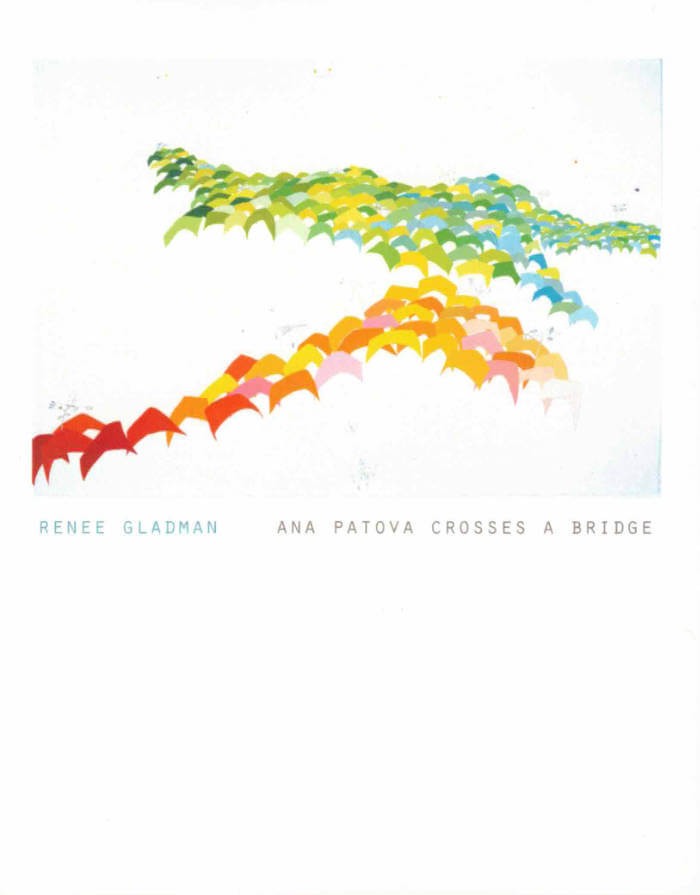
Ana Patova Crosses a Bridge
“Ana Patova Crosses a Bridge is the third volume of Renee Gladman’s magnificent, melancholy series about the city-state of Ravicka, or about the architectures of its absence. It is tempting to read the Ravickian books as an extended allegory—of architecture itself, perhaps, except that architecture is already half-allegorical, its every element raised to prefigure whatever meanings can make their way to them. If any can. In Ravicka, meanings—indeed most contact of any kind—remain in abeyance, building, in absentia, the constitutive negative spaces of the narrative. There is a plot; it lays out zones of sheer ambience. Experiences, of which there are many, unfold as a redolent lingering in the structures of immateriality, the radical realities of the insubstantial. Gladman is a philosopher of architecture, though not that of buildings. Rather, she thinks (and writes) the drifts, partitions, and immobilities of identity, affect, communication, the very possibility of being human. Profound, compelling—haunting, even—the story of Ravicka is astonishingly ours.” - Lyn Hejinian
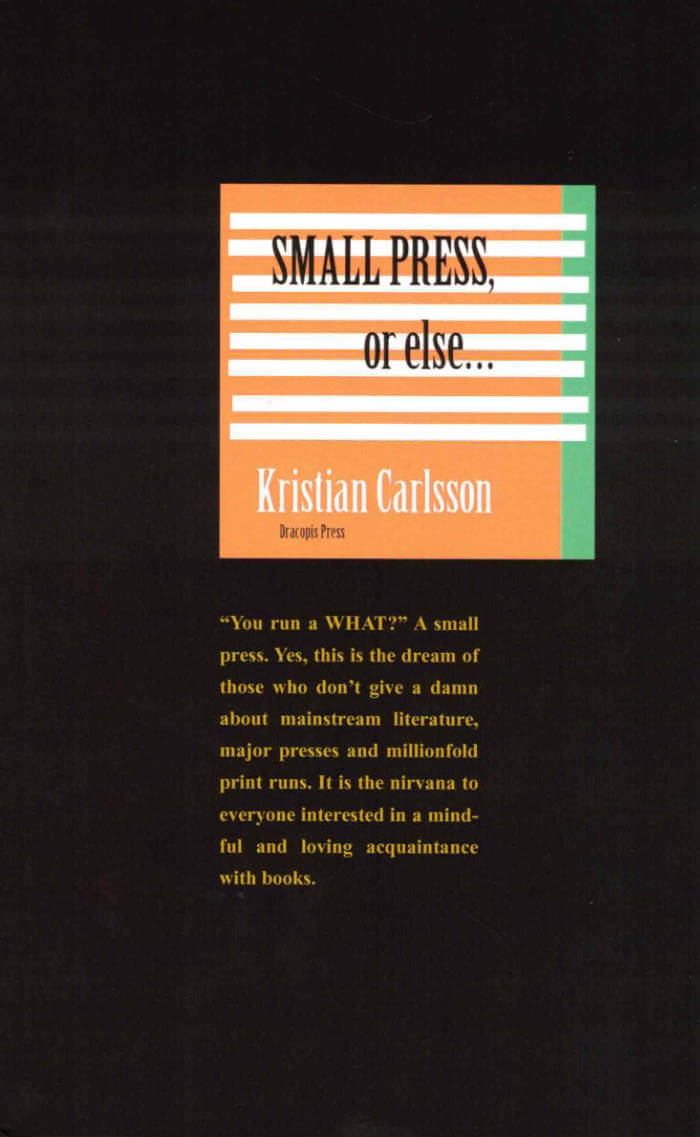
Small Press, or else...
“You run a WHAT?” A small press. Yes, this is the dream of those who don’t give a damn about mainstream literature, major presses and millionfold print runs. It is the nirvana to everyone interested in a mindful and loving acquaintance with books.
“Start out small. Continue smaller if needed. Never end. Dream big. Continue dreaming bigger if needed. Make sure to keep being considered small.”
This is not a basic guide, it is a fun and inspiring glance at the inner depth of a small press. With enthusiasm and distinctness the publisher gives advice on everything from networking to handling the scripts to creating and selling a book.
Kristian Carlsson (b.1978) is published in a number of select small presses following his literary debut in 1996. For a decade he had been engaged as an occasional guest editor and project based publisher, when he in 2009 founded Smockadoll Förlag [Smockadoll Press] and decided to publish contemporary poetry. In 2012 Smockadoll was featured by the news agency TT/ Spektra as one of a handful of today’s unsurpassed Swedish small presses for translated literature. During the years Kristian Carlsson most certainly has had time to break each and every one of the small press guidelines issued in this volume.

Poetry, or else...
The poet, the unknown being… a loony, a dreamer, a hermit. The poet writes poetry… but really, what is poetry? Arts, politics, mere amusement?
This little book is an insight into the mindset of someone who just can’t help but to be a poet. It is a manifesto for the freedom of thought and expression, an essential source of motivation and inspiration for readers and writers alike.
Anisur Rahman (b.1978) made his poetic debut in 2003. As a journalist, translator and playwright he has further contemplated the poetic mind. Born in Bangladesh, he writes in both Bengali and English, but nowadays lives exiled in Sweden.

The Lip Anthology: An Australian Feminist Arts Journal 1976–1984
Lip Magazine was self-published by women in Melbourne from 1976 to 1984 and stood as a lightning rod for Australian feminist artistic practice throughout the Women’s Liberation era. The art and ideas expressed over Lip’s lifetime track groundbreaking moves in performance, ecology, social-engagement and labour politics—all at an intersection with local realities. Collecting and presenting the materials of Lip for the first time since their original appearance, The Lip Anthology, edited by Vivian Ziherl, privileges the range and dynamism of contesting feminisms that comprised the Lip project.
Designed by: Marc Hollenstein
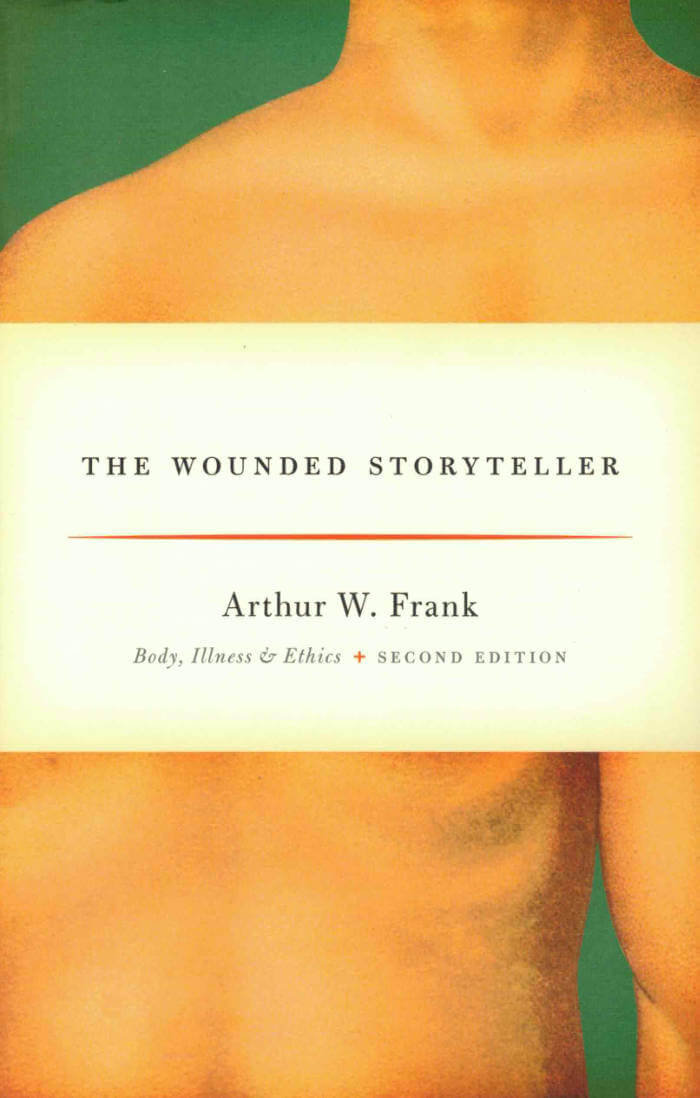
The Wounded Storyteller: Body, Illness, and Ethics
Since it was first published in 1995, The Wounded Storyteller has occupied a unique place in the body of work on illness. Both the collective portrait of a so-called “remission society” of those who suffer from some type of illness or disability and a cogent analysis of their stories within a larger framework of narrative theory, Arthur W. Frank’s book has reached a large and diverse readership including the ill, medical professionals, and scholars of literary theory.
Drawing on the work of authors such as Oliver Sacks, Anatole Broyard, Norman Cousins, and Audre Lorde, as well as from people he met during the years he spent among different illness groups, Frank recounts a stirring collection of illness stories, ranging from the well-known—Gilda Radner’s battle with ovarian cancer—to the private testimonials of people with cancer, chronic fatigue syndrome, and disabilities. Their stories are more than accounts of personal suffering: they abound with moral choices and point to a social ethic.
In this new edition Frank adds a preface describing the personal and cultural times when the first edition was written. His new afterword extends the book’s argument significantly, writing about storytelling and experience, other modes of illness narration, and a version of hope that is both realistic and aspirational. Reflecting on both his own life during the creation of the first edition and the conclusions of the book itself, Frank reminds us of the power of storytelling as way to understanding our own suffering.

Working Title
An overview of Phill Niblock's work since the 60's, through about twenty essays and interviews by musicologists, art critics and historians, various documents, scores, and more than 8 hours of videos on 2 double layer DVDs.
With a career spanning more than 40 years, Phill Niblock has not only proven himself as one of the most preeminent composers of the American musical avantgarde, but also an accomplished filmmaker and performer. He is also revered as an events producer through his Experimental Intermedia Foundation, providing a venue and a label that has been of great assistance to numerous other artists and musicians in helping to make their work known.
This bilingual book (French / English) provides an in-depth look at all these activities, through various essays and interviews, either newly written, previously unpublished, or that have never been available in French before. These were written by very different people—from musicians who have played Niblock's music, to fellow composers, from long-time friends to specialized musicologists and art historians. They discuss such various matters as musical and cinematographic aesthetics, psychoacoustic processes, historical background, philosophical insights and technical advice for playing the music, or just give their personal recollections of time spent together with Niblock.
The book is accompanied by 2 double-sided DVDs of atypical videos: Remo Osaka, a continuation of The Movement of People Working series, with a quite peculiar soundtrack; two separate DVDs of the Anecdotes from Childhood, best viewed together as an installation; and Katherine Liberovskaya's 70 for 70 (+1), Seventy (one) Sides of Phill Niblock, realized in 2003/2004 on the occasion of his 70th birthday, which portrays the composer through memories recounted by friends and relatives.
With writings by Phill Niblock, Rich Housh, Erika King, Guy de Bièvre, Volker Straebel, Richard Glover, Alan Licht, Seth Nehil, Rob Forman, Johannes Knesl, Arthur Stidfole, Juan Carlos Kase, Raphael Smarzoch, Jens Brand, Bob Gilmore, Ulrich Krieger, Richard Lainhart, Bernard Gendron, Susan Stenger, Mathieu Copeland, and liner notes from the first two LPs.

Pages 9 - Seep
Babak Afrassiabi, Nasrin Tabatabai
This issue of Pages assumes seep as a post archival mode: in the Merriam-Webster dictionary the verb 'seep' is translated as follows: to flow or pass slowly through fine pores or small openings, to enter or penetrate slowly, to become diffused or spread.
The biology or politics of seeping is like that of raw petroleum oozing at natural oil seeps. Unlike refined oil which has sponsored modernization and its aligned archives, crude oil pours beyond historical purpose and defies structural elevations. It instead disfigures the ground through which it dubiously spreads.
Seeping is a posthumous affair. It is the gradual leaking of a long withdrawn interior. Like the bleeding of a punctured corpse, when the pumping of the heart has stopped, when the body is lifeless and apathetic to any 'hail', yet continuing to bleed. Seep as archive is an eternally post-apocalyptic expansion, retraction, deviation, subtraction, or simply the arrival of (non-)things.
With contributions by:
- Mariam Motamedi Fraser / Geo-Archive
- Richard Goldstein / Dennis Oppenheim's Dilemma: Should he Sell Art to the Shah?
- Babak Afrassiabi, Nasrin Tabatabai / Contemporary Hole / Unfilmable
/ Seep
- Saleh Najafi / Wounds of Archive¹
- Mark von Schlegell / The Artist Abstract #6
- Nima Parzham / The underground
- Adam Kleinman / Vanished Theories
- Suzanne Treister / Algorithm
- Alexi Kukuljevic / The Dissolute Subject
- Matts Leiderstam / Andy Warhol, Suicide (Purple Jumping Man), 1963
- Eugene Thacker / Black Infinity; or, Oil Discovers Humans
- Vivian Ziherl, Natasha Ginwala / Infrastructural Suspensions: Global Spanning, Atmospheric Seepage and Measures of the Undecidable

Our Lady of the Flowers, Echoic
In Our Lady of the Flowers, Echoic, Chris Tysh newly translates Notre-Dame-des-Fleurs, compressing Jean Genet's disturbing 1943 novel into cuttingly charged verse. In the blue hours of the Parisian underworld, pimps, drag queens, and butchers in bloody aprons are joined by Divine, Mignon Dainty-Feet, and the young assassin Our Lady, three saintly figures in a forbidden realm of the senses.
Tysh cuts Our Lady of the Flowers, Echoic into a ghostly song that traces the path from prose to lyric where Divine switches gender and names "as if passing under a scarlet awning." Suturing sexual otherness to an aching of gendered expectations, Tysh's cadences embrace postmodernism's emblematic penchant for all manner of appropriation, and recycling finds a radical iteration in the fashion of fairies, queens, and stool pigeons.
"This volume of verse, played over by a flickering ghostly flame, is perhaps the book that Genet meant to write..."—John Tranter
With an preface by Robert Glück.

Silence: Lectures and Writings
Silence: Lectures and Writings is a book by American experimental composer John Cage (1912–1992), first published in 1961 by Wesleyan University Press. Silence is a collection of essays and lectures Cage wrote during the period from 1939 to 1961.
Most of the works are preceded by a short commentary on their origins, some have an afterword provided. Several works feature unorthodox methods of presentation and/or composition. "The Future of Music: Credo" juxtaposes paragraphs of two different texts. The text of the first part of "Composition as Process" is presented in four columns, the text of "Erik Satie" in two. "45' for a Speaker" is similar to Cage's "time length" compositions: it provides detailed instructions for the speaker as to exactly when a particular sentence or a phrase should be said. "Where Are We Going? and What Are We Doing?" is presented in several types of typeface to better reflect the concept of the lecture, which was originally presented as four tapes running simultaneously. "Indeterminacy" is a collection of various anecdotes and short stories taken from life or books Cage read: the concept is to tell one story per minute, and to achieve the speaker has to either speed up or slow down, depending on the length of the story.

Cunt Norton
In Cunt Norton, the sequel to her unforgettable CUNT UPS, Dodie Bellamy "cunts" The Norton Anthology of Poetry (1975 edition), setting her text-ravenous cut-ups loose to devour the canonical voices of English literature.
The texts that emerge from this sexual-linguistic encounter are monstrous, beautiful, unashamed: 33 erotic love poems ("the greatest fuck poem in the English language," according to Ariana Reines) that lust after the very aesthetic they resist. "These patriarchal voices that threatened to erase me—of course I love them as well," Bellamy writes. Even as Cunt Norton dismembers the history of English poetry, "cunting" Chaucer and Shakespeare, Emerson and Lowell, it simultaneously allows new sexual members to arise and fill in the gaps, transforming the secret into the explicit, the classically beautiful into the wonderfully grotesque. Bellamy's cunted texts breathe life into literary "masters" with joy, honesty, hilarity, and insatiable passion.
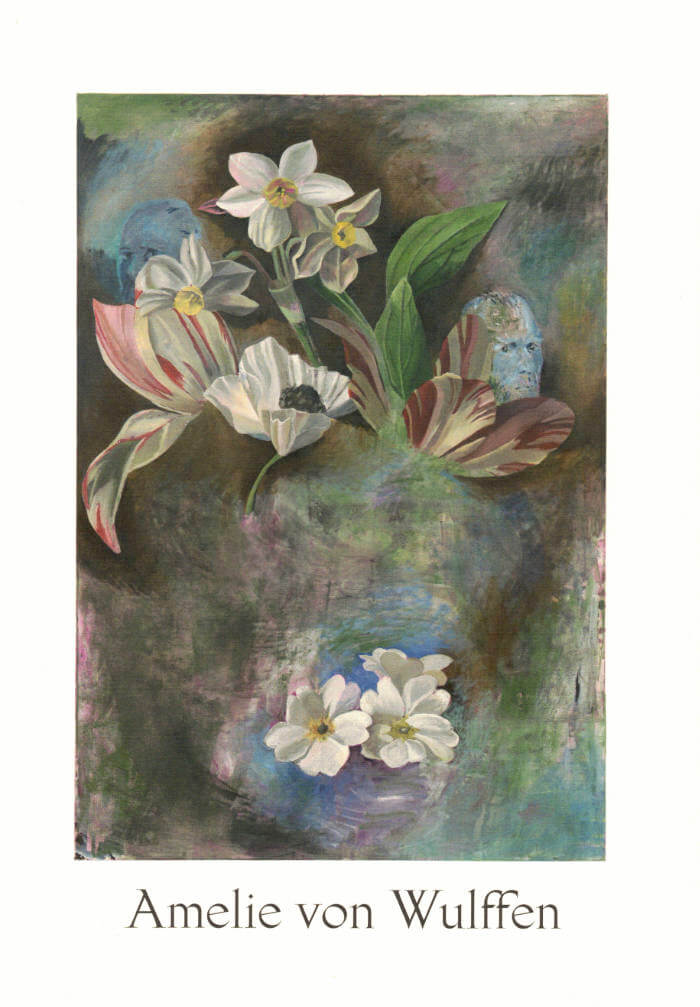
Amelie Von Wulffen
Published on the occasion of her Aspen Art Museum exhibition, the artist's first solo presentation in an American museum, this catalogue focuses on Amelie von Wulffen's recent work, including paintings created during her time as the AAM's 2012 Jane and Marc Nathanson Distinguished Artist in Residence. The artist deploys a host of painterly techniques that—while departing from the photographic collage practice for which she is best known—remain deeply referential, wryly revisiting and reprocessing tactics and tropes of modern painting from European Romanticism onward.
The lavishly illustrated publication features an essay by AAM CEO and Director, Chief Curator, Heidi Zuckerman Jacobson, as well as a foreword by Cay Sophie Rabinowitz.
Published 2013

Autoportrait
This publication of “Autoportrait,” translated into French for the first time, is accompanied by a foreword, and a critical and biographical structure by art historian Giovanni Zapperi, showing the singularity of Carla Lonzi's project. Made up of a series of recorded interviews, subsequently transcribed and recomposed to give birth to a particular textual montage, “Autoportrait” is an experimental attempt to reinvent art criticism thanks to a fragmentary discourse and an iconography in which reproductions of works mix with intimate images. An invaluable document on Italian art in the 1960s, “Autoportrait” is a polyphonic book, “a kind of maieutic banquet” to which Carla Lonzi invites us in order to rethink the production of discourse on art and artists.
Interviews with Carla Accardi, Getulio Alviani, Enrico Castellani, Pietro Consagra, Luciano Fabro, Lucio Fontana, Jannis Kounellis, Mario Nigro, Guilio Paolini, Pino Pascali, Mimmo Rotella, Salvatore Scarpita, Guilio Turcato, Cy Twombly...
Under the direction of Patricia Falguières, the “Lectures Maison Rouge” series has as its ambition to propose artist's texts which interrogate at the same time museology, exhibition making, and the work of certain artists themselves.
The life and work of Carla Lonzi (1931–1982) is inseparable from the cultural, political, and social history of Italy in the decades following the Second World War; she occupies a singular position, which today merits reevaluation. A reputed art critic of the 1960s artistic scene, both friend and collaborator of such figures as Carla Accardi, Luciano Fabro, Giulio Paolini, and Jannis Kounellis, she wrote “Autoportrait” in 1969, a “love letter” to the artists and to creation, but also a farewell chorus to art criticism and the art world. The following year she founded Rivolta Femminile, an active feminist collective, thus becoming the central figure of Italian feminism.
See also the English translation, published by Divided Publishing: Self-portrait, by Carla Lonzi

Reading / Feeling
Frédérique Bergholtz, Tanja Baudoin
Reading / Feeling examines affect, a term that delineates a field where the personal and political meet in sensory movements between bodies. A pre-emotional experience, affect constitutes the social and economic relationships that make up the fabric of society. Reading / Feeling considers the meaning of affect in theory and artistic practice through texts by theoreticians, artists, and curators read in If I Can’t Dance’s Reading Groups in Amsterdam, Toronto, and Sheffield as part of the programme for Edition IV – Affect (2010–12). It also includes three new essays, short statements by Reading Group members, and artist pages.
Contributors: Sara Ahmed, Rhea Anastas, Lauren Berlant, Leo Bersani, Lone Bertelsen, Gregg Bordowitz, Judith Butler, Jeremiah Day, Gilles Deleuze, Lucien Febvre, Simone Forti, Adam Frank, Andrea Fraser, Félix Guattari, Michael Hardt, Sharon Hayes, Brian Holmes, Jutta Koether, Glenn Ligon, Brian Massumi & Mary Zournazi, Helen Molesworth, Andrew Murphie, Sina Najafi & David Serlin, George Orwell, Emily Roysdon, Eve Kosofsky Sedgwick, Baruch Spinoza, Susan Sontag, Jan Verwoert; it also includes: essays by Tanja Baudoin, Emma Cocker, Jacob Korczynski; contributions by Reading Group members Stephen Bowler, Alison J Carr, Belen Cerezo, Jon Davies, Anik Fournier, Victoria Gray, Linda Kemp, Wjm Kok, Janice McNab, Gabrielle Moser, Cecilia Paldino, Andrew James Patterson, Hester Reeve, Julie Swalloa, cheyanne turions, Vivian Ziherl; and artist pages by Matthew Lutz-Kinoy.

Girls Against God Issue #1
In collaboration with cross-disciplinary artist Bianca Casady of music duo CocoRosie, 2013 brought the release of a new print magazine entitled Girls Against God (GAG). A boldly feminist exploration and multi-generational endeavor, GAG deploys the arts to illuminate the oppressive, obsolete nature of traditional, male-defined religions and other patriarchal institutions—“We must resist and reinvent,” Casady declares.
Created in partnership with artist Anne Sherwood Pundyk, GAG’s now out-of-print debut issue is a lushly colorful tabloid-sized print publication, showcasing provocative, original artwork alongside comprehensive interviews and essays with an international cadre of artists.
Issue #1—Antony / Gabby Bess / Melanie Bonajo / Vaginal Davis / Yasmine Hadan / Emely Neu / Kembra Pfahler / Marguerite Stern / Alexyss K. Tylor / Johanna Constantine / Mary Hanlon / Julie Higonnet / Molly O’Brien / Chloe Olewitz / Alice O’Malley / Kara L. Rooney / Jean Marc Ruellan
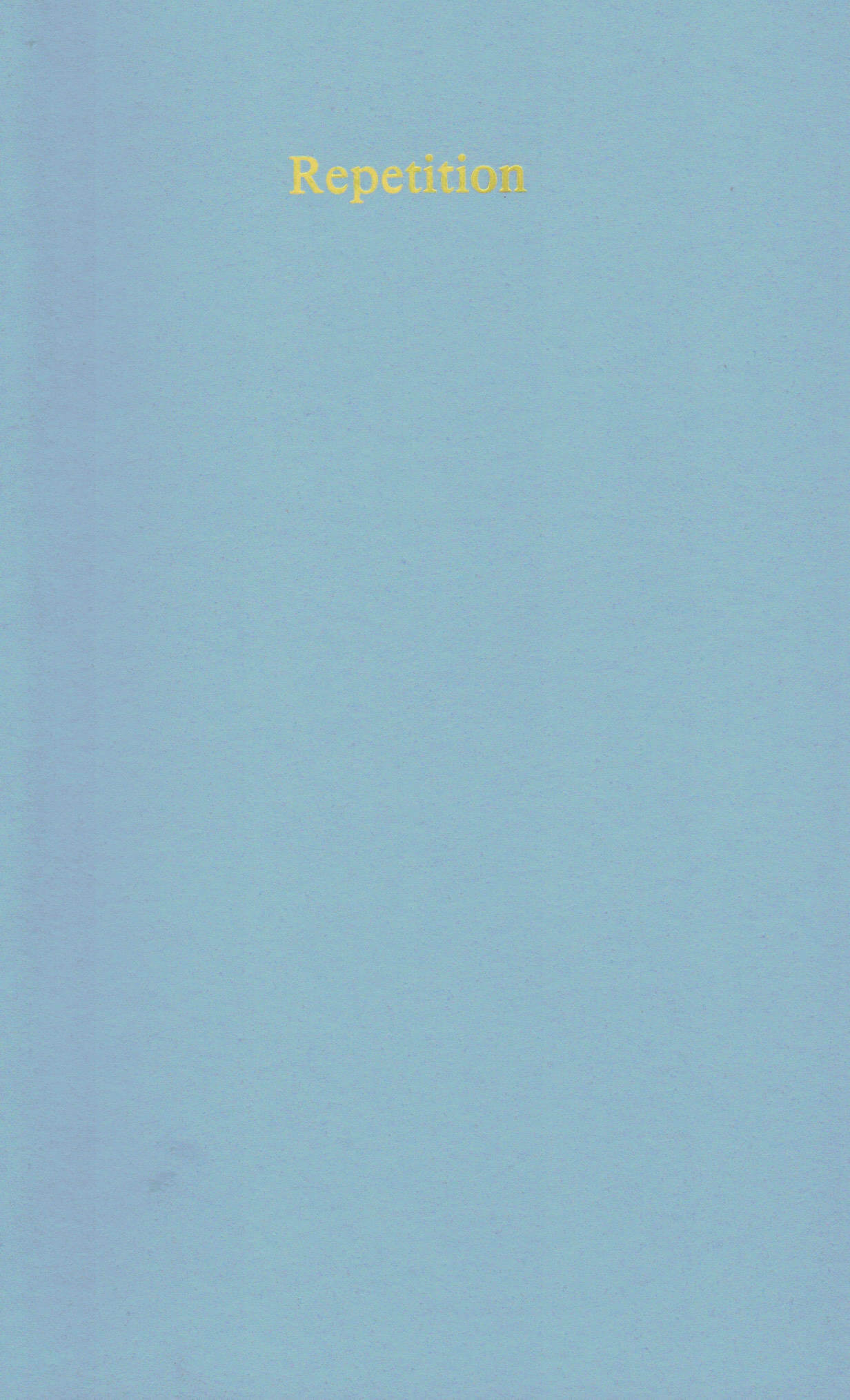
Repetition
An English translation of Peter Handke’s 1986 novel Repetition, previously out of print for a quarter of a century.
“In Repetition, Handke allows the peculiar light which illuminates the space under a leafy canopy or a tent canvas to glisten between words, placed here with astounding caution and precision; in doing so, he succeeds in making the text into a sort of refuge amid the arid lands which, even in the culture industry, grow larger day by day.” —W. G. Sebald
“In his earliest work … Handke found a way of conveying a state of mind … where words seem to come between you and the world, where nothing coheres or appears natural, and from the vantage-point of which the ease with which other people talk and go about their business seems deeply suspicious. But just as Kafka felt there were moments when, miraculously, a written sentence – even one written by himself – seemed full light, seemed to fill its own space and establish its own rhythm, and when even the whole story seemed mysteriously to stand as solidly in the world as a tree or a rock, so it has been with Handke. He has, in his later work, appeared to make a conscious effort to escape from the debilitating awareness of his own lack of authority or authenticity, and tried to write as though somehow the story were already written, had, in a sense, always been there… Repetition is the triumphant climax of his career so far…
What saves the book from the sort of sentimentality we find in John Berger’s recent work is first of all Handke’s uncanny ability to convey what it is this urge for pattern has to overcome, and secondly, his extraordinary attention to detail, historical, geographical, botanical, and linguistic. (No review can possibly convey the richness of Filip’s meditation on his brother’s two books, or Handke’s magical way with images.)
His narrative … is one of the most dignified and moving evocations I have ever read of what it means to be alive, to walk upon this earth.” —Gabriel Josipovici

After Delores
A new edition of Sarah Schulman's acclaimed 1988 novel, a noirish tale about a no-nonsense coffee-shop waitress in New York who is nursing a broken heart after her girlfriend Dolores leaves her; her attempts to find love again are funny, sexy, and ultimately even violent. After Delores is a fast-paced, electrifying chronicle of the Lower East Side's lesbian subculture in the 1980s.
Sarah Schulman is the author of sixteen books, including the novels The Mere Future, The Child, Rat Bohemia, and Empathy (all from Arsenal Pulp Press) and the recent nonfiction works The Gentrification of the Mind: Witness to a Lost Imagination and Israel/Palestine and the Queer International. She was also co-producer with Jim Hubbard of the feature documentary United in Anger: A History of ACT UP and is co-director of the ACT UP Oral History Project. She lives in New York, where she is Distinguished Professor of English at City University of New York (College of Staten Island) and a Fellow at the New York Institute for the Humanities at NYU.